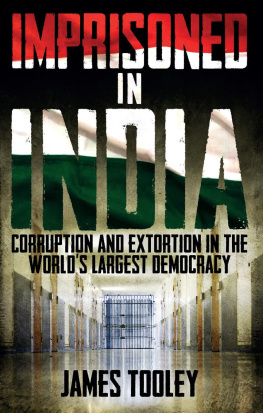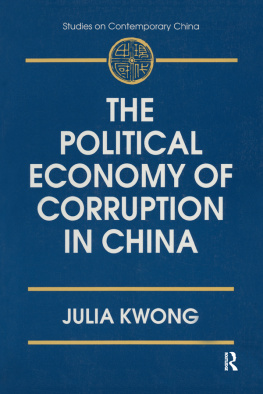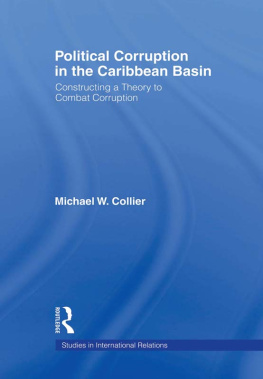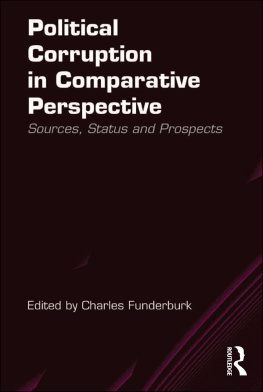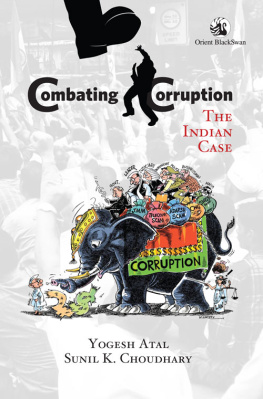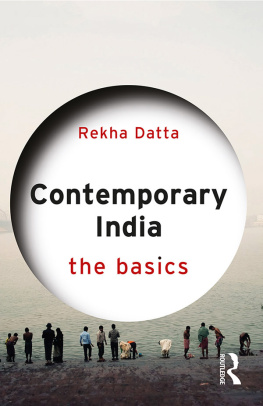WHY SCAMS ARE HERE TO STAY
Also by N. Ram
R. K. Narayan: The Early Years: 1906-1945 (with Susan Ram)
WHY SCAMS ARE HERE TO STAY

UNDERSTANDING POLITICAL CORRUPTION IN INDIA
N. RAM


ALEPH BOOK COMPANY
An independent publishing firm
promoted by Rupa Publications India
First published in India in 2017
by Aleph Book Company
7/16 Ansari Road, Daryaganj
New Delhi 110 002
Copyright N. Ram 2017
All rights reserved.
The author has asserted his moral rights.
The views and opinions expressed in this book are the authors own and the facts are as reported by him, which have been verified to the extent possible, and the publishers are not in any way liable for the same.
No part of this publication may be reproduced, transmitted, or stored in a retrieval system, in any form or by any means, without permission in writing from Aleph Book Company.
ISBN: 978-93-84067-31-1
1 3 5 7 9 10 8 6 4 2
This book is sold subject to the condition that it shall not, by way of trade or otherwise, be lent, resold, hired out, or otherwise circulated without the publishers prior consent in any form of binding or cover other than that in which it is published.
For
Wayne Barrett (1945-2017),
friend of fifty years and champion investigative reporter
CONTENTS

A NOTE ON THE BOOK

This book is organized into an .
deals with Indias anti-corruption laws and their notoriously poor enforcement.
The is a sketch of the Marxist understanding of political corruption, which offers a radical alternative to mainstream approaches. It helps to explain, for example, why contrary to the predictions of neo-liberal economic theory, corruption has grown exponentially in the era of liberalization.
hypothesizes that several Indian states have their own corruption systems, with well-established patterns, clear rules of the game, identifiable actors, and regional and local specificities. It draws on some original material to present a sketch of Tamil Nadus scientific system of political corruption that has been developed over the past three-and-a-half decades and has proved virtually ineradicable. This chapter proposes that focused empirical research should be conducted to build up a composite picture of the systematization of corruption arrangements across politically federal India, with implications for how to combat them.
The to say that without making deep and radical changes to Indias political economy, it will not be possible to prevent and eliminate the endemic and deep-seated disorder. Subject to this general limitation, the conclusion suggests what can be done to minimize, contain, and combat corruption under nine broad heads. These proposals cover laws, enforcement capacity, policies, institutions, regulation, vigilance, the corporate sector, journalism, and politics.
N. Ram
Chennai
May 2017
INTRODUCTION

When David Davidar invited me to do a book on political corruption, drawing on my journalistic experience of investigating the Bofors scandal, for Alephs Spotlight series, the working title he had in mind was India: A Corrupt Society (with the option of having a question mark at the end). I pushed back, proposing that since corruption was a vast and unmanageable subject with too many fuzzy areas, the scope of the book should be restricted to what I thought was interesting and manageable. So this book began, as the subtitle indicates, as an attempt to get the measure of political corruption in contemporary India and to see what could be done to combat it.
Political corruption is often treated as a separate and distinctive subset of corruption in journalism, in the literature of the social sciences, and by anti-corruption organizations and movements worldwide. Transparency International (TI) defines it as a manipulation of policies, institutions, and rules of procedure in the allocation of resources and financing by political decision-makers, who . But, as we shall argue in this book, this is an inadequate, indeed a blinkered view of political corruption, with serious implications for how to combat it.
As I got into the subject, delved into some of the theoretical and empirical literature, and reflected on the complex character of corruption, its sources, determinants, and effects and, crucially, the interrelationships and policy issues involved, two things became clear.
First, there is no such thing as political corruption as a self-contained category, unless you are satisfied with the tautological definition that political corruption is corruption involving politicians and political rents. If the objective is to understand corruption in India in its pervasiveness, its omnipresence, and its multifariousness, so that something meaningful and effective can be done about it, necessarily in stages, it needs to be conceptualized and approached as a problem not just of politics or the economy or society, not to mention the moral spherebut of the political economy in its complex, interdisciplinary, and profound sense.
Second, it is futile to speak of corruption at large as though it were one mode of moral and social behaviour. There is corruption and corruption and you need to disaggregate and differentiate it if you are going to get some purchase on it. This is best done by looking at the effects of specific types of corruption in society. When you do this, you can distinguish corruption that is seriously damaging from other types that are not as damaging or far less damaging or, as some political theorists suggest, even beneficial in a qualified way given the circumstances (for example, by oiling the wheels of a beneficial scheme, which otherwise would not get implemented at all). Making such distinctions may be hard to swallow for moral campaigners but there is simply no other way to make sense of corruption.
An explanation of the use of the word scam in the title, which my publisher encouraged: scam, which has many registers and emphases of meaning but essentially denotes a swindle, is not a term that figures frequently in this book. But it is the word most widely associated with corruption in the Indian public imagination, not least because it is the word most frequently encountered in the news media. The etymology of scam is unknown but it is generally believed to be of American origin. Herman Melvilles great nineteenth century novel, The Confidence-Man
Scam is not a scientific term but as a commentator on English usage points out, it seems to contain its meaning within the sound of the word itselfits short and clear, and the sound is just unpleasant enough to put you on guardhave their rich and colourful correspondences and variants for scam, again with many registers and emphases of meaning.
Next page

